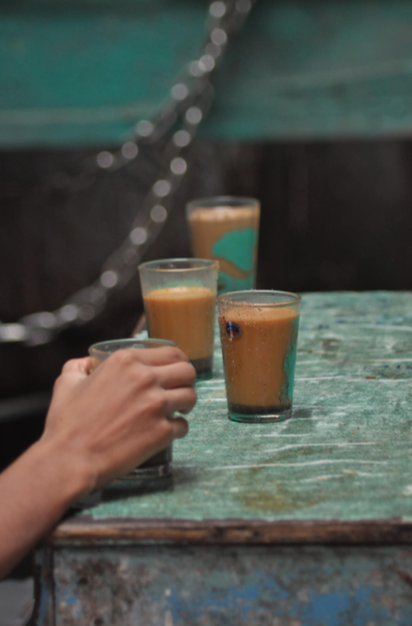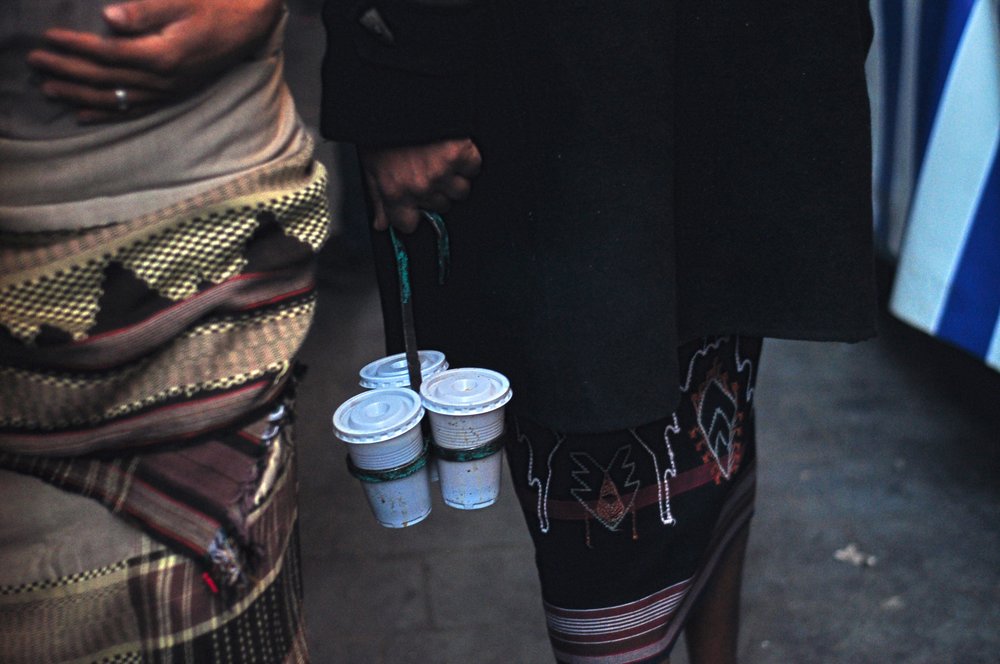
This post is also available in: العربية (Arabic)
In Aden, taking tea has been a social ritual for two centuries. The city, like other ancient coastal cities, is noted for its rich, deep-rooted and diverse traditions – including its diverse cuisine, a result of its interaction with the many nations of Africa, Asia and even Europe.
Aden, which overlooks the southwest coast of the Arabian Peninsula, features hundreds of teashops. They fill the air with delectable fragrances, and adorn the city’s streets with the lively spirit of its people. Teashops, old and new, across all eight districts in the city, are brimming with customers. Every district has a distinct identity according to its location and lifestyle.
According to the Crater Municipal Office, there are more than 40 teashops and tea-sellers in the district. An unofficial count of all teashops in Aden resulted in 350 teashops and tea-sellers. Teashops outnumber restaurants, as it is Adenis’ favorite hot beverage.
 Photo Courtesy of Rahman Taha
Photo Courtesy of Rahman Taha
A minimum of three cups of tea a day is the norm, according to Al-Hajj Ali Ahmed; one in the morning, one at noon, and one in the evening. Others drink upwards of five cups a day of the sweet, hot beverage. A cup of tea goes for 50 Yemeni riyals, where five cups would cost a total of one US dollar. Uncle Ali Ahmed is a resident of Al-Taweelah neighborhood in the old city. He says that his love of tea is tied to memories of old friends he would meet on the patio of the Abdan Al-Qadeem teashop in the neighborhood, one of the oldest neighborhoods in Aden.
“Frequenters of teashops discuss the many topics of life: politics, culture, literature, religion, art, and music”, Uncle Ali says. “These teashops are a meeting point for friends to share their personal concerns, social issues – to recall memories of a beautiful past and to discuss the worries of the present.”
Tea was brought to Aden by Indians in the 19th century. Some historians have mentioned that Adenis took eagerly to tea as soon as it arrived, quickly adopting it as a daily beverage.
Adeni tea has many names. According to Bilal Ghulam, an Adeni historian:
“Al-shai al-nos is tea with extra milk; al-shai al-jarw, also called al-razeen, is tea with less milk; al-asmali tea – a nomenclature of Ottoman origin – refers to a weak tea which is prepared by boiling only water and tea leaves… Milk-tea is more widely known among the public. Milk is added to tea to boil over low heat. Mixed spices are added, including walnut, cardamom, and a little ginger for those who want to take their tea in the Indian style. There are two popular ways to prepare tea: the old way on coals, or on a gas oven as is prevalent in modern times.”
Ghulam elaborates:
“The secret of the tea’s delicious flavors relies on two components. First, the tea must be boiled for a duration known to older residents of Aden of the 19th and 20th century, which needs extensive experience. Second, the quality of the tea leaves. In the past, the assab wala was favored in Aden.”
On the importance of the quality of the water in making the exquisite teas of the past, Ghulam explains:
“During the British Occupation, filtered water was brought to the teashops of Aden from al-Farsi ice factory, which was located in the Bomba area at the edge of the Seera coast. The water adds a flavor distinct to Adeni tea. The quality of the milk was also important; milk was brought from dairy farms belonging to Adeni families.”
 Photo Courtesy of Rahman Taha
Photo Courtesy of Rahman Taha
In May 2016, lovers of Adeni tea organized a two-day Adeni Tea Festival to showcase the history of Adeni tea. The festival highlighted how Adeni tea has evolved since its introduction to the city, and its intimate relationship with Adeni society over the years. The festival was located in the historic Manarah Square, above the old city of Crater, attracting large crowds from all the neighborhoods of the city.
The festival is the first of its kind, highlighting tea as a cultural component of Aden. A trivia contest tested competitors on facts relating to tea and its ties to the culture of the city – winners were given cups of tea. Tea was distributed, accompanied by oud music and dancing by the attendees.
Dalida Salem, festival organizer, states:
“Certain cities are characterized by customs and traditions which are integral to their identity. These cities seek to immortalize and renew these traditions to adapt to the modern age. They also seek to bring international attention to cultural features that would come to symbolize them. For example, Italy is famous for its pizza, while Japan is known for sushi. Aden is famous for its food, such as sayadia, and for its tea.”
On organizing the festival, Salem adds:
“The goal of the festival is to celebrate Adeni Tea Day locally and abroad. It aims to preserve the cultural features of Aden, memorializing them in history, to place Aden among those cities that preserve and safeguard their heritage, culture, and history.”
While newer teashops are more numerous, the older teashops still retain a special distinction. They reflect the cultural heritage of a city in love with tea: a city which features tea as a distinct component of its cultural forums and political debates. In the 1960s, several notable teashops opened, such as Seilan teashop in Al-Sabeel Street and Sakran teashop in Al-Sheikh Abdullah Street.

Photo Courtesy of Rahman Taha
Among the venerated teashops is Shawkat Al-Somali teashop in Al-Za’faran Street, Zeco and Al-Ghabri teashops in Al-Maydan Street, Al-Somali teashop in Al-Mu’ala, Al-Duba’I teashop in Al-Tawahi, Al-Shajara teashop in Seikh Uthman, and Fare teashop which was previously located in Hassan Ali Street and moved to Al-Za’faran in the 1980s.
The teashops of the old city of Aden still retain their elegance and venerable features: that ‘Best Quality Tea’ made by older generations. However, the tradition of drinking tea and conversation is not exclusive to older generations, as youth also meet at Al-Sakran or Al-Shajara teashops, to converse and discuss their lives, concerns, politics, history and religion. To this end, the Adeni teashop is a space reserved not only for the consumption of beverages but also a space where we can distinguish how people relate to each other in a community, the features that divide them, and the issues that concern them.




